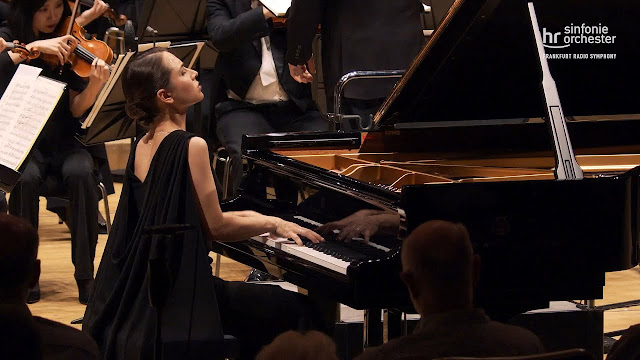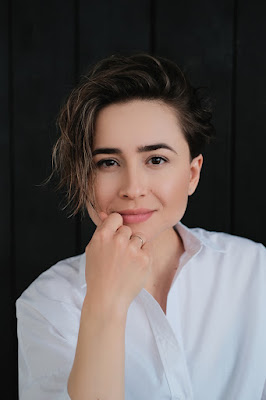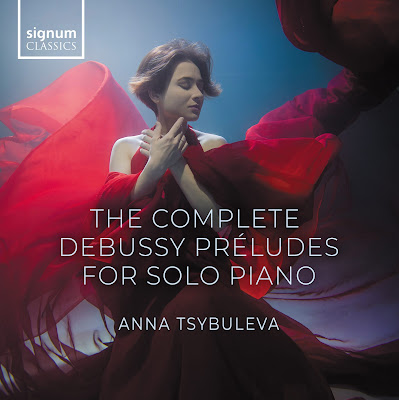 |
| Prokofiev: Piano Concerto No. 2 – Anna Tsybuleva with hr-Sinfonieorchester, Alain Altinoglu |
I first chatted to pianist Anna Tsybuleva back in 2021 (by Zoom from her house in the Caucasus) when having won the Leeds International Piano Competition in 2015 with her performance of Brahms’ Piano Concerto No. 2, she chose the work for her debut concerto recording on Signum Classics. [see my interview].
Anna is now back with another recording on Signum, this time Debussy’s complete Préludes for Solo Piano. Whilst she was in London recently as part of a six-week tour where she was also taking in Switzerland, the Netherlands and Norway, I met up with Anna to chat about Debussy’s music and piano technique, plus her wish to go deeper into the music of Rameau.
 |
| Anna Tsybuleva (Photo: Anna Gryzlova) |
Whilst the leap from Brahms to Debussy might seem surprising, Anna finds it interesting to go in different directions at the same time, finding it good for both her outlook and her development. Also, Debussy’s Préludes are special for her. She first came across them at school, finding them not easy but then came back to them when she was a student in Basel. From the first, she felt her connection to Debussy to be very strong, and at the Hochschule für Musik Basel, her professor, Claudio Martínez-Mehner gave her what she calls his magical key to Debussy’s world. Before this, she had a very general approach to playing the piano, then in a lesson her professor said that in her playing she gave too much piano for Debussy. She could not understand what he meant, but then she realised that Debussy did not want a specifically piano sound, the music should be the sound of wind, sunlight or water, of emotions. The piano became a very different instrument; this opened her eyes and educated her piano playing in general.
A lot of the time, particularly in the 19th century, composers were writing for something bigger than the piano, evoking nature or emotions. Debussy said that he wanted to open new realities with his music. All this came together in her playing and began her long friendship with Debussy. She changed her approach to other music, and she points out that even a piano sonata needs more than just the piano sound; the piano can be whatever you want it to be.
She admits that she dreams of playing all of Debussy’s piano music, but in the Préludes you can see the whole spectrum of his imagination. The images that he collected throughout his life come together in the 24 Préludes. These images would come out in other compositions such as Pelleas et Melisande, but in the Préludes, Debussy give us the seeds of these, concentrated views of images from a larger world. Debussy did not like the word Impressionism and his music is in fact more Symbolist. There are connections to nature, and what the rhythms and colours of the music mean is important. Also, Debussy has taught her that the performer is not important. Understanding comes with age, you need to be invisible and if she inserts too much of her personality into the music, then it becomes something different.
Each of the Préludes has a title. Debussy did not like talking about the Préludes and was in two minds about the titles, placing them after the music. This means that when you play them, your imagination can be free and maybe afterwards you can compare this with what Debussy thought. Anna finds this an interesting process, both for the performer and for the listeners. Some of the Préludes come from distinct impressions and you have to open your imagination. Normal piano technique does not always work with Debussy, making the music accurate but more about the pianist, and Anna feels that the performance is a balance, between named and unnamed things.
She has recorded them complete. Some are popular and some are rarely played. Some, such as Feuilles mortes are deep, with reflections of life and nature in them, and so important yet they do not work well alone, you lose some of their sense. Anna feels that when you are in the process of discovering them, you hear more details when you hear all of them. She likens a complete performance not to relaxation but to meditation and feels that we can learn a lot from the music, even for an audience listening to them complete. This Summer she was able to play all 24 in Lyons, but sometimes promoters are wary, worrying that the audience may get bored, but she finds that listeners usually get hooked!
Choosing repertoire for recordings is difficult and before embarking on this disc she had long discussions with the label and with her agent, she was hearing so many different voices. She admits that there are so many other recordings including some legendary ones, but you must also consider what you feel. It is her passion, her energy and she wants to dedicate this energy to particular repertoire. When it came to choosing Debussy, she is pleased that she listened to her inner motivation. She adds that it is important that you go your own way, otherwise there is a danger of being lost amidst all the conflicting opinions.
Steve Long and Signum warmly received the idea of recording the Debussy Préludes and her agents were supportive too. She feels lucky to be surrounded by supportive people, then she adds ‘or maybe I don’t listen to those who don’t support me’!
Regarding further repertoire, she dreams of performing more French early music. Debussy was inspired by Rameau and Couperin, and Anna already includes some Rameau in her repertoire. She wants to extend this aspect of her repertoire further, bringing her knowledge about the nature of sound to this earlier era. Rameau wrote books (his 1722, Traité de l’harmonie réduite à ses principes naturels) about the connections between music and the natural world, and this inspires her and she wants to go deeper into his music.
Her next London concert is at the new Bechstein Hall (12 November) when she plays an all-Rachmaninov programme including some of the Preludes and Sonata No. 2. On her current tour her repertoire includes not only Debussy, but Rachmaninov, Rameau, Mozart, Schumann, Grieg and Tchaikovsky. This is what she likes in programmes, to mix things up, to have these different problems in her head. When you play something on repeat, you can become a machine and you need change. She started playing Rachmaninov last season and hopes to record some of his music.
She is currently in discussions about future recording programmes, and her wish list of music and projects is evidently ‘endless’.
She recently started two courses, on the history of Early Baroque Music and on the history of music notation, as she feels that these were areas she did not study enough when she was a student, as you were too busy preparing for concerts and competitions. Now she sees that to be really serious, you must get a deeper education. She admits that she dreams of being able to improvise, but when she started studying the piano her teachers did not support this idea. Music education in Russia adhered to a very strict programme, there was no time to improvise or compose. Instead there were lots of exercises and set pieces, but also her teachers were neither interested nor supportive. Now, she misses the skill and wants to be able to improvise in her own voice, feeling it will help her understand the process of composing. She finds it hard, however, her brain wants simply to read the music, so progress is slow, for them moment.
She feels that performer need all these different ways of approaching music, otherwise you are very weak. She wants to be able to understand why composer wrote what the did, why the music is written like that. For her, every note is a treasure, and she finds it inspiring to see composers’ own manuscripts.
Debussy’s complete Préludes for Solo Piano – Anna Tsybuleva – Signum [Link Tree]
12 November 2024 – Anna Tsybuleva at Bechstein Hall [further details]
The blog is free, but I’d be delighted if you were to show your appreciation by buying me a coffee.
Elsewhere on this blog
- A bright beginning: Three Sonatas reveals the distinctive voice of young composer Sam Rudd-Jones in chamber music that intrigues – record review
- Provoking the inner senses: Mendelssohn’s Elijah in the majestic surroundings of King’s College Chapel, Cambridge – concert review
- Gentle Flame: Liz Dilnot Johnson’s diverse output showcased in this disc celebrating her relationship with Ex Cathedra – record review
- Forging ahead: Specializing in the performance of Wagner operas, the London Opera Company in Siegfried – opera review
- A terrific achievement: professionals & amateurs come together at Sheffield’s Crucible Theatre performing Jonathan Dove’s The Monster in the Maze in celebration of Music in the Round at 40 – opera review
- Fauré and Friends: I chat to violinist Irène Duval about her explorations during the composer’s centenary celebrations – interview
- The Heart of the Matter: rare Britten and new James MacMillan in an imaginative programme for tenor, horn and piano – concert review
- The Turn of the Screw: Charlotte Corderoy’s notable conducting debut at ENO with Ailish Tynan’s compelling performance – opera review
- An engaging evening of fun: demonstrating the very real virtues of Gilbert & Sullivan at its best, Ruddigore at Opera North – opera review
- Beyond the idea of just four guys & their trombones: Slide-Action on their mission to create a new voice for the trombone – interview
- Home









